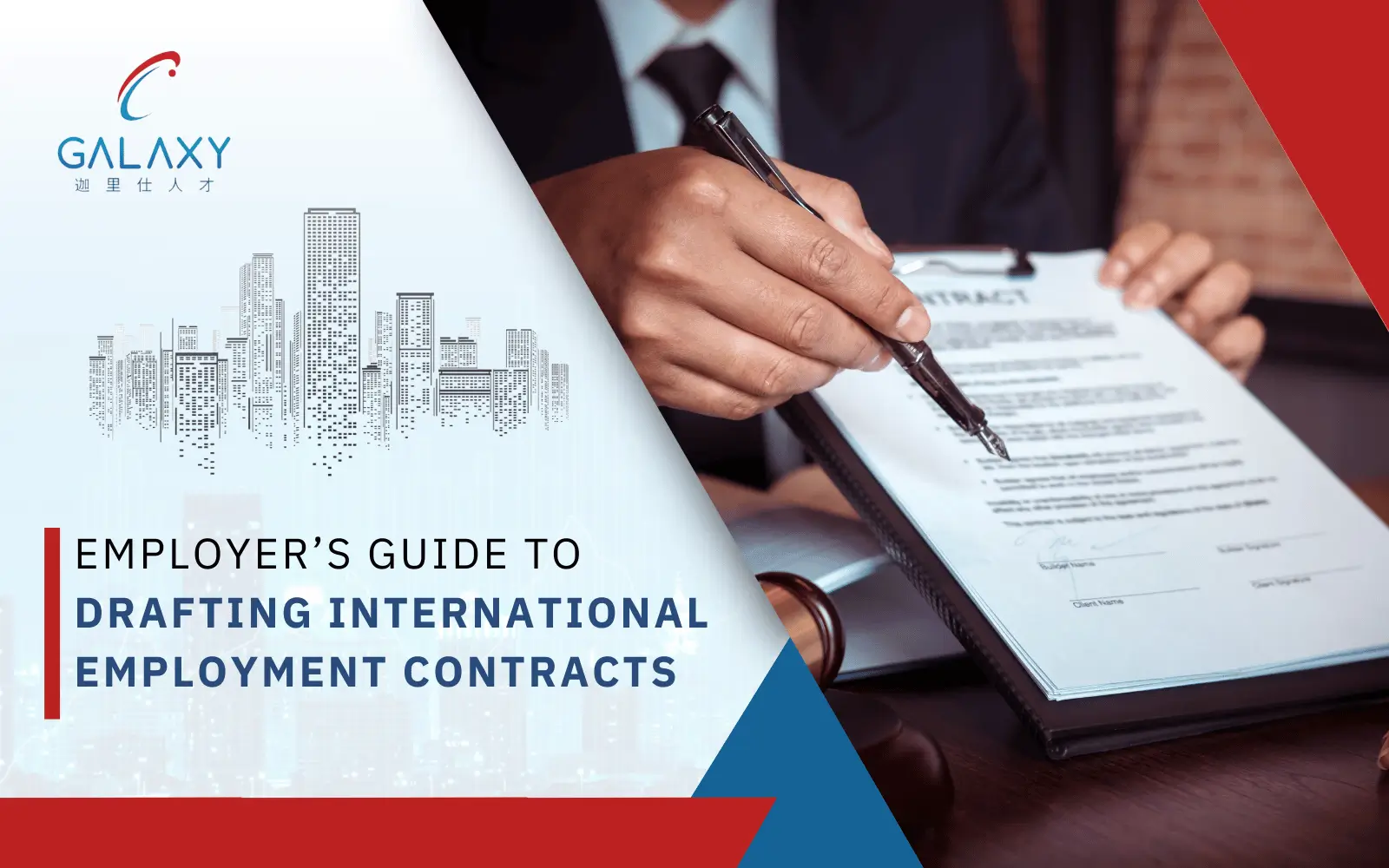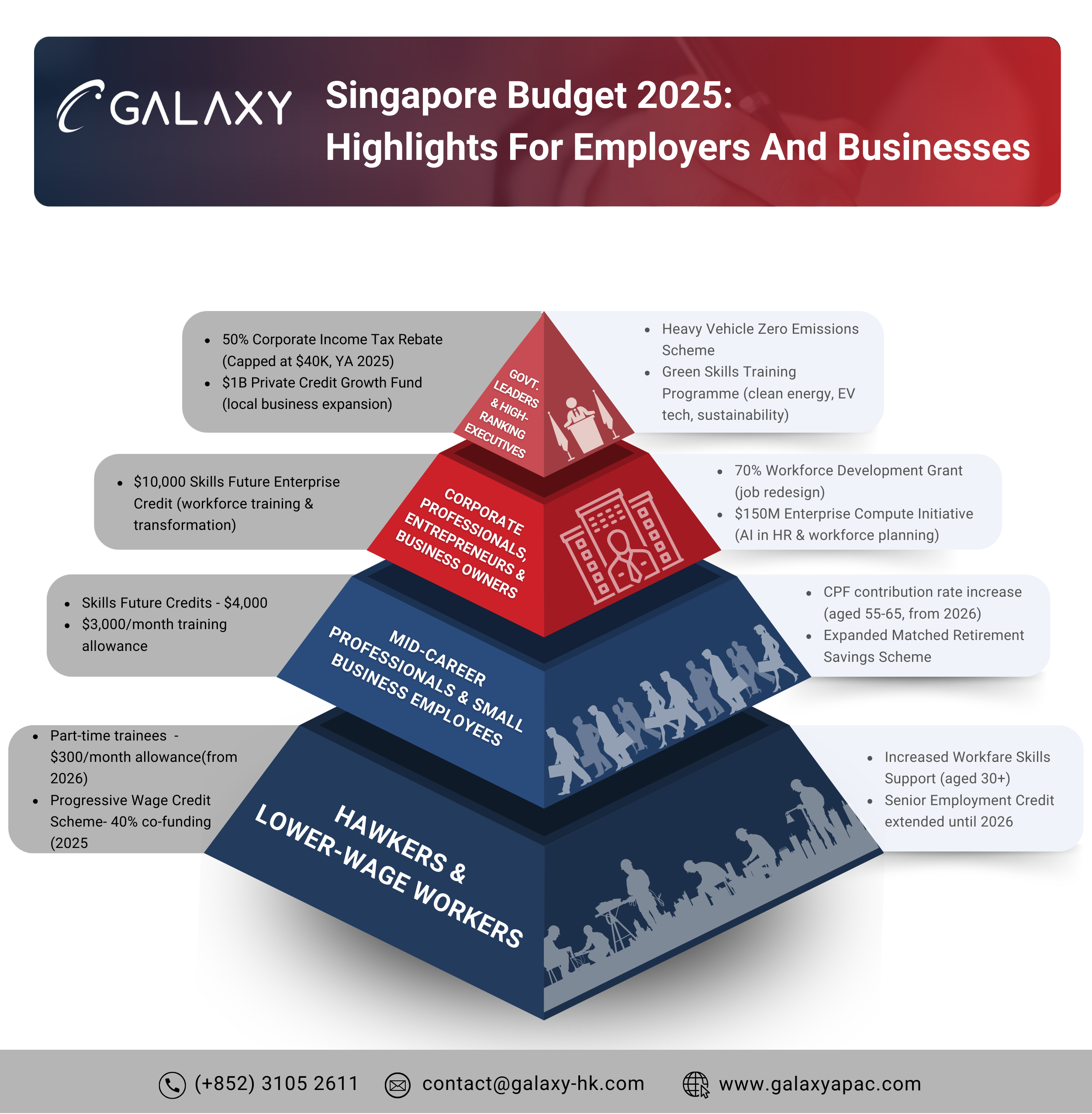Employer’s Guide to Drafting International Employment Contracts

In an era where remote work and cross-border hiring are the norm rather than the exception, international employment contracts have become a cornerstone of global workforce management. These agreements ensure legal compliance across jurisdictions, define the employer–employee relationship, and provide a framework to address risks and responsibilities.
At Galaxy Group, we recognise the challenges of global hiring and offer strategic insights to simplify your journey. This guide is a practical reference for drafting compliant, effective employment contracts, particularly for businesses operating in or expanding to Singapore and beyond.
Table Of Content
- What Is an International Employment Contract?
- Why Is an International Employment Contract Necessary?
- What Should Be Included in an International Employment Contract?
- Which Clauses Are Critical for Legal Protection?
- How Does International Contract Law Affect Your Obligations?
- What Are the Common Mistakes to Avoid?
- Conclusion
What Is an International Employment Contract?
An international employment contract is a formal agreement between a company and an employee based in another country. Unlike local contracts, these must comply with the employment laws of the employee’s country of residence.
They serve as a mutual reference point for responsibilities, rights, compensation, and conduct, ensuring both parties are protected under applicable law.
Why Is an International Employment Contract Necessary?
Without a properly drafted contract, employers expose themselves to legal, financial, and reputational risk. These agreements are essential for the following reasons:
- Compliance with foreign labour laws and statutory requirements
- Protection of employer interests in areas such as confidentiality and IP
- Clarity around duties, compensation, and performance expectations
- Legitimacy of employment, especially for immigration or permit purposes
Countries with strong employee protection frameworks often require a written contract by law.
What Should Be Included in an International Employment Contract?
The strength of an international contract lies in its detail. A comprehensive contract should include the following fundamental elements:
1. Basic Information
- Full name, residential address, and tax identification number of the employee
- Registered name and address of the employer
- Job title and department
- Start date (and end date, if fixed-term)
2. Job Description and Responsibilities
Clear definition of the employee’s role, duties, and performance expectations. Ambiguity here can lead to disputes or claims of unfair dismissal.
3. Contract Type
Specify whether the role is:
- Full-time or part-time
- Fixed-term or indefinite
In some jurisdictions, fixed-term contracts automatically convert to indefinite after a certain period—something that must be addressed clearly.
4. Working Hours and Overtime Policy
Define the standard workweek, rest periods, and rules for overtime compensation. Refer to local laws—some countries enforce maximum weekly hours, mandatory rest, or time tracking requirements.
5. Compensation and Benefits
Outline all financial terms, including:
- Base salary (currency should be clarified)
- Bonus structures, allowances, and commissions
- Statutory and company-provided benefits (healthcare, pension, 13th-month pay, etc.)
- Payment schedule and applicable tax deductions
6. Leave Entitlements
List the types of leave the employee is entitled to, such as:
- Annual paid leave
- Sick leave
- Parental or maternity leave
- Public holidays
Include how leave is accrued and whether unused leave is carried forward or paid out.
7. Probationary Period
If applicable, define the duration of probation, its conditions, and whether termination or confirmation applies at the end. Some countries limit the length or legality of probation periods.
8. Termination Terms and Notice Period
Include:
- Grounds for termination (e.g. performance, misconduct, redundancy)
- Required notice periods for both parties
- Local severance pay regulations
- Restrictive termination conditions (e.g. protection during maternity or medical leave)
9. Intellectual Property Rights
Clearly outline ownership of work and innovations created during the course of employment. Employers must protect:
- Trade secrets
- Software, patents, and designs
- Confidential strategies or client data
10. Confidentiality and Post-Employment Restrictions
Include enforceable clauses such as:
- Non-disclosure agreements (NDAs)
- Non-compete clauses
- Non-solicitation of clients or employees
The validity of these clauses varies widely by jurisdiction, so legal review is essential.
Which Clauses Are Critical for Legal Protection?
Certain clauses carry greater legal weight in cross-border disputes. These include:
- Governing Law and Jurisdiction – Which country’s law applies, and where disputes will be resolved.
- Force Majeure – Addresses unforeseeable disruptions (natural disasters, war, etc.).
- Data Protection – Specifies adherence to regulations like GDPR, if applicable.
- Amendment Procedures – How and when the contract terms can be altered.
These provisions provide legal certainty, especially when different legal systems are involved.
Read our guide on: Employee Engagement in Difficult Times: 6 Key Strategies
How Does International Contract Law Affect Your Obligations?
While the term “international contract” implies a global standard, there is no universal employment law. Instead, employers must comply with:
- National employment laws of the employee’s country
- Regional or provincial laws (e.g. state-specific regulations in the U.S. or provinces in Canada)
- International treaties (such as tax treaties to prevent double taxation)
Failing to consider these obligations may render the contract unenforceable or subject the employer to fines and litigation.
What Are the Common Mistakes to Avoid?
- Using a generic contract across all countries
- Omitting mandatory local benefits or notice periods
- Failing to update clauses when local labour laws change
- Confusing an offer letter with a legally binding contract
- Neglecting to consult legal experts or in-country advisors
Employers should also beware of fixed-term contract conversions and unintentional breaches of Collective Bargaining Agreements (CBAs), which may override individual contract terms.
Conclusion
In the global workplace, an international employment contract is not merely paperwork—it is your primary safeguard. It protects your business, empowers your workforce, and ensures compliance with complex, evolving legal frameworks.
At Galaxy Group, we support employers in crafting watertight, legally compliant employment contracts for international hires. Whether you’re hiring across Asia, Europe, or the Americas, our experts help you navigate the full lifecycle of international contract law—from drafting to execution and beyond.
Ready to hire confidently across borders? Contact Galaxy Group today and ensure your international employment contracts are built to last.
Disclaimer: This blog is for informational purposes only and does not constitute any legal advice.
Secure Your Global Hiring Today
Avoid costly compliance mistakes. Let Galaxy Group help you draft secure, compliant international employment contracts—fast.
FAQ’S
What are international tax treaties, and why do they matter in employment contracts?
Tax treaties are bilateral agreements between countries designed to prevent employees and companies from being taxed twice on the same income. If you’re hiring an employee based abroad, it’s crucial to determine whether your country has a treaty with theirs. These treaties can offer tax credits or exemptions, which must be considered during contract drafting to ensure accurate net salary calculations and legal compliance.
Should employers use fixed-term contracts for international hires?
Fixed-term contracts can be practical for short-term roles, but they come with risks if the employee remains in the position long-term. In some countries, such as the United Kingdom and Japan, continuous employment under fixed-term contracts can result in the employee automatically gaining permanent status. As laws differ globally, employers should understand the local regulations before opting for this arrangement.
What are Collective Bargaining Agreements (CBAs), and how do they impact contracts?
CBAs are negotiated agreements between employers and employee unions, often setting higher standards than national labour laws, such as extended annual leave or additional benefits. For example, in France, CBAs are common and can override individual employment contract terms. If hiring in regions where CBAs are active, it’s wise to consult or collaborate with unions to ensure compliance and avoid complications.
How can employers handle payroll challenges for international remote employees?
Managing payroll for overseas employees can be complex. Issues may arise around local minimum wages, overtime pay, salary increments, and leave entitlements. Employers must refer to the employment laws applicable in the employee’s country and ensure these are reflected in the contract. Partnering with a global Employer of Record (EOR) can help streamline payroll while ensuring full compliance.
What distinguishes an offer letter from an employment contract?
An offer letter usually outlines initial job details and intentions, but it is not always legally binding. In contrast, an employment contract is a formal legal document that details the full scope of the working relationship. In some countries, like those in Europe or Asia, an accepted offer letter may legally bind the employer—so it’s vital to ensure consistency between both documents and understand local implications.
Can a single employment contract be adapted for different countries?
Yes, but each version must be tailored to the specific legal framework of the employee’s country. There is no one-size-fits-all solution in international employment. Collaborating with legal professionals or global HR service providers is highly recommended to ensure each contract respects local laws and cultural practices.
What’s the best way to ensure global contract compliance?
Staying compliant starts with understanding local labour laws and updating contracts when regulations change. Employers can either build internal legal and HR teams or work with specialised partners such as Employer of Record service providers. These professionals manage compliance, draft contracts, and assist with international onboarding, saving time and reducing legal risk.



